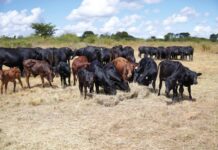The mist covered the hills and a soft wind blew gently over the fragmented fields of Rwanyege village. It would have been a normal morning in this rural part of Burundi’s Ngozi Province in Busiga commune, the day where almost everyone goes to farm, but that day in February 2018, was different.
Emmanuel Niyibizi had an outside-the-box idea for Busiga – to grow chilli pepper. He shared it with his parents, but they were lukewarm. Except for having one or two plants in the backyard that would yield a dozen chilli peppers to spice up their food, no one had done it before at scale. The other known use of chilli pepper for the people here was told in legend; that their ancestors used it to ward off evil spirits.
“I told [my parents], give me that piece of land in the valley please. I want to farm chilli peppers,” recalls Mr Niyibizi, who at the time thought that it would be easy.
The seeds were ready but Mr Niyibizi’s parents said chilli farming was a waste of time. For generations, the family had farmed beans, corn, bananas and mostly coffee, a symbol of wealth in Burundi’s rural areas.
Holding the chilli seeds, Mr Niyibizi was anxious, but he had already made up his mind. He planted the seeds in two raised beds, expecting 10 days later to transplant the chilli in the Nyamugerera valley that separates Burundi and Rwanda.
Opportunity
Mr Niyibizi, 29, lives in Zone Mihigo, a commune of Busiga in Ngozi Province was convinced that there was an opportunity to make money from farming and selling pepper to restaurants, hotels, pubs and grilled meat shops.
His first harvest was 80 plants. He sold almost all of it, estimated at 50 kilogrammes. He decided to expand his chilli pepper farm, and realised that he would need fertiliser and some help to increase his produce.
“I convinced my former classmates and told them that there was a huge opportunity in chilli farming,” said Mr Niyibizi, introducing me to Egide, one of the 40 young people who turned to chilli farming following his example.
“We always thought that coffee was the big thing, but after selling one kilogramme of chilli for 3,500 Burundian francs ($1.76), we realised that it was way better than selling one kilogramme of coffee for 800 Burundian francs ($0.4),” said Egide pointing to his chilli farm.
Chillies grow well in hot weather with a lot of sunlight. Like most plants, chillies are prone to pests and diseases. The most common pests are thrips, mites, aphids and whiteflies. These however can be prevented by soil treating and weeding around the host plants.
“My first yield was 50kg, but after optimising my farming techniques, the next season I harvested 100kg. Now I am at 300kg per month and my target is 1,000 kg per month by next year,” said Mr Niyibizi.
As his ambitions grew, he decided to learn about the business side of chilli farming. He attended entrepreneurial training courses, and one that made the difference for him was organised by Adisco (Appui au Développement Intégral et à la Solidarité sur les Collines), a local NGO that launched an agribusiness incubation programme called Maison de l’Entrepreneur, to support young entrepreneurs.
Equipping entrepreneurs
“At Maison de l’Entrepreneur we work with all kinds of entrepreneurs, particularly those in the agriculture sector. Every year we call for applications, looking for dynamic young people who have ideas, the potential and the will to go through our pre-incubation programme. We train them, connect them to funding opportunities and offer them acceleration services,” said Chantal Ntima, the co-ordinator of Maison de l’Entrepreneur.
Since its creation in 2015, the Maison de l’Entrepreneur programme has facilitated many businesses owned by young people.
“The most beautiful success stories we have are projects in chilli pepper,” she added.
At the end of the programme, in 2019, inspired by the Akabanga chilli oil hot sauce made in Rwanda, Mr Niyibizi launched his own brand called Karababa.
In Busiga commune villagers use chilli as insecticide to preserve their bean harvest. In Burundi after Dichlorodiphenyltrichloroethane (DDT) an insecticide used in agriculture was banned in 2003, farmers turned to chilli pepper to protect their harvest from dangerous insects.









